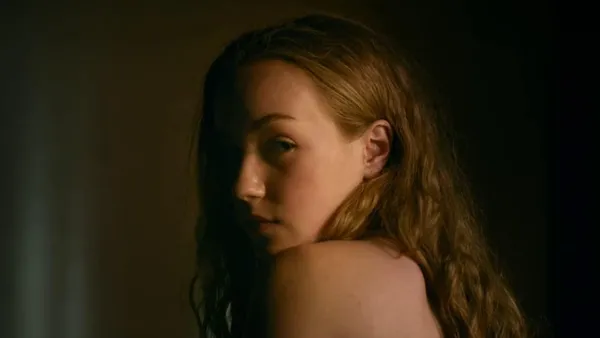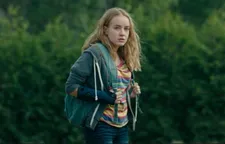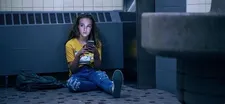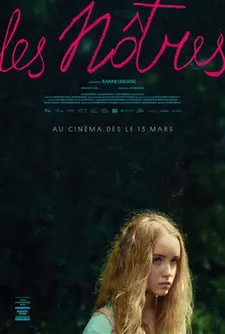 |
| Emilie Bierre as Magalie in Les Nôtres |
A close-knit small town community in Quebec. The shocking discovery that a 13-year-old girl is pregnant. A tide of accusations and condemnations which brings all sorts of unpleasant things to the surface. Jeanne Leblanc’s bruising new drama, Les Nôtres (aka Our Own), is hardly the first film to have addressed subject matter like this, but it’s rare in its perceptiveness about what it’s really like for a young teenager to face such struggles, and it features an astonishing central performance by Emilie Bierre. When I met Jeanne she opened our conversation by saying that she thinks a female perspective really brings something different to the mix.
“This is a three woman movie. Marianne Farley, who is playing the mom, also co-produced and Judith (Baribeau) co-wrote. And I think the first idea comes from Marianne. It came with this real story, but way darker, and I got the impression that it was too hard to show. We got the feeling that the audience is not ready to see the real life. But then came this basic idea of the silence. And we saw this 60 Minutes interview with Bill Clinton regarding the Monica Lewinsky affair. When they asked him why he did it, he said ‘I did it because I could.’ And then I wanted to research because this sentence seemed so powerful for us. Because this is the way it happens. Because they can. It's because we allow that.
 |
| Childhood interrupted |
“So we started to read and research. If you read just Lolita and you think it over, you're just like, ‘Oh my God,’ it appears so real. And then you read about the real story. I read about David Hamilton's story, the photographer, it was just before the #MeToo movement. And it's amazing how it was so powerful. And when you look at the statistics, today, even after the #MeToo movement, just 30% of the victims will go to the police. And from this 30%, it's just one will get caught and will go to prison or will get a sentence. So it makes us see how even after the #MeToo movement, how powerful this social structure that we put around those powerful people is, so strong.
“ I think also it was men who were telling those stories before. Not that many woman told the story. And the thing I found interesting – because I was reading a lot about that – it's this concept of justice. Like, we punish the bad guy. This is so patriarchal. It's never about the empowerment of the victims. It's never about how we can reconstruct the lives of the victims.
“It's men who are punishing men. And that's why I think it needs to be a woman's story. With three woman at the top of this film, as scriptwriter and director and producer, we always talked about that how the system is made to make us feel right and not to make the victims feel right. I really wanted to tell a story that will reflect this specific reality that we don't want to see. 90% of the victims will live that life and not the one that will make us feel great. So that's why, but I think that this is one of the many reasons, because the audience needs to feel right, because there's so many male filmmakers. And I don't want to say that it's better, because it's just a different point of view. We need all the stories, not just one, from one point of view.”
I tell her that I find the central character, Magalie, intriguing in that regard because she’s at an age where she’s very focused on her own empowerment but the older man responsible for her pregnancy has exploited that, leading her to think that she’s being empowered when really she’s out of her depth.
 |
| Time to talk? |
“Yeah,” says Jeanne. “It's such a vulnerable age, 14 years old, 13 or 14. I was so confused, confused about my sexuality, confused about what I wanted to do in life. I was getting the sensation that I can do something in my life, but in reality, you can not because you're only 13, and your parents are there. The interesting thing is, when we started the audition... we were thirtysomething when we wrote the script. We were not teenagers anymore. And I really love to work with the actors from the real age of the character, because they bring me something so fresh. And I remember we saw, I think, 40 girls, and they all brought something more to Magalie. I was just amazed by how mature they were but in essence, they are at the same point as Magalie is.
“When Emelie came in to audition, she said something that we added into the direction that you see on screen. And she said, ‘I think she thinks she's really in love.’ She got the impression that it's real love. She didn't see everything around it that she will see when when everything falls. At the beginning, she's got the impression that she's really in love. And we talked about the feeling to fall in love at 13 years old, and she was 14 when she came in to audition. It was one of the most interesting conversations. She said, ‘She thinks she's got something real.’ And I found it so interesting.
“I did many short films for teenagers. And every time they teach me something, and I learned something new because they are more mature than I think I was at 13 years old. And the thing is, they see the world as we should see it, like it should be that innocent, but it's not real.”
She worked hard to make sure that the set would be a safe space for the young cast members, she says.
“We made sure that there won't be any flirting allowed on set, there won't be any sexual comments or anything. I think we had one of the most respectful teams that I ever worked with.”
 |
| Facing rejection at school |
This helped the adults too, she explains, including the man with the difficult role of playing Magalie’s abuser. When it came to Magalie herself, she was really impressed by Bierre’s approach.
“When she came into audition, she was so emotionally charged, she really wanted the part. Between her and I, it was so easy. I can say just one word and she will integrate it. It was a real connection in the audition, we did a few takes and then we cried. Everybody cried because she can go in some dark place but you see innocence at the same time. This is so impressive. And then during all the preparation, the two months before shooting, we didn't work on the words but we worked on the arc of the character, the big arc. And then we decided at some point when when we studied together, how she is, why and how she reacts. We decided to place a soundtrack of music with every specific point how she feels that will resonate with her, and I make sure that during the shooting, if I feel that we are disconnected, we will find some space with the music and we can just reconnect. It worked so well because then she can get grounded into the right emotion at the right moment. And then she she performed, as you can see on screen.”
We discuss some of the ways that people have reacted to the film and how easy it is to forget what it’s like to be that age – how seeking help from adults or adult systems isn’t an automatic response.
“We talked a lot about all those topics with all the other actors,” she says. And then we started to talk about our own childhoods or when we were teenagers, and to realise that this is not just a situation... there's the shame, there’s ‘How will people see me?’, there’s ‘How I should protect this love relationship?’ All this goes on with Magalie. But then there's also this: they really want to be independent. And I wanted to be independent at the same age. And you see the adult world like people cannot understand you, like ‘How can my mom understand my real love story? Because for the past five years, she didn't get anybody in her life, she can’t understand me, she can’t understand the way I really feel.’ And it's the biggest trap because she cannot understand, and then there is ‘I went too far. I need to tell her the whole story, but it's too late.’ And I think it's the same for most of the teenage victims.
 |
| Sports day |
“The other thing that I found really interesting is in Quebec, when you see the statistics about those situations, many people do not complain when they are between 11 and 17. If it happens at those ages, they will do the official complaint just at 30 years old. Because they repress so many things. They wanted to keep it in a small box in their head in this specific place, the safe place, because they wanted to protect the love story, but there’s the shame also and those mixed feelings that they will have at this age. And if I remember myself, if something like this had happened to me at the same age, I don't think I would have said, to be honest.”
Then, without wanting to give away spoilers, there’s another concern: that maybe if people did find out, they wouldn't be as helpful as they ought to be.
“You never know how people will react when it comes to themselves,” says Jeanne. “Because sometimes they will feel ashamed because they didn't see it. They will feel like they cannot believe it. They will just start to patronise. Sometimes we want to protect ourselves first. This is this is this is just self preservation instinct. So I don't think she's totally wrong in her thoughts.”
We also talk about the racism that emerges in the community around Magalie, and I ask her if she sees these themes as interconnected.
“There's the power of the silence but there's also this the fact that small communities will try to protect themselves first,” she responds. “This is the self preservation instinct that I talked about. And we can see that in the last year, in the pandemic year. When people feel like there's something that can attack them they will try to protect themselves. And this is the way the way I saw it. The other thing is I can came from a small village from the exact same place and people don't think they are racist. They really believe that they are not. In Quebec, now there's this story in a hospital, in the city that I come from, there's this indigenous woman who died there, and it was so hard, what they [nurses present at her bedside] said, so hard, way harder than what you can hear in the film. And the nurses said, in court, ‘I'm not racist.’ And I really truly believe that they believe that they are not racist. They are just like, ‘Yes, but this is the way indigenous people are. Yes, this is the way that Mexican people are.’ And they really think they are not racist. This always amazes me. And maybe it's one of the biggest themes of the film.’
 |
| Les Nôtres poster |
I note that it seemed to me like a useful way to look at sort of the things that people take for granted and what they think are the proper roles of each individual in the community – a view of life which Magalie’s pregnancy upsets.
“Sure. And I think they will never say that as articulately. It's an instinct and I truly, truly believe that they don't see how bad it is.”
There was one scene that really stood out to me in the film, which is the very last one, where we see Magalie in the back of a car and her face slowly starts looking older. It’s a powerful moment. How intentional was it?
“Very intentional,” Jeanne says. “We worked a lot on it with the hair, make-up and wardrobe people, to make a real evolution and in her character. And I should say that hair, make-up and wardrobe did an amazing job for the three woman because we marked three or four steps in their evolution and their physical transformation, but for Magalie, we really wanted to give her all this question of empowerment.”
We discuss the way that Magalie’s appearance changes back and forth over the course of the film, so that sometimes she looks almost like an adult and at other times very obviously a child, and how unsettling that can be for viewers. Jeanne recalls a conversation with a member of her crew when they were both unsettled by how adult and sexual some of the girls looked when dancing. It was an effect they had aimed for but which worked better than anticipated.
Her big hope for the film is that it will start conversations.
“I really do hope that people will not just talk about the film but the topic of the film, with their teenagers, about their experiences, if they feel angry or happy or whatever they feel. There's something emotional coming up. I hope people will talk. It's a movie about silence but I really hope it will do the total reverse.”
She’s currently working on her next film, which she hopes to start shooting next year – an intimate story about a couple. She’s also become absorbed by learning about the acting process and she’s excited to see where all that will take her next.
Les Nôtres is available in select North American cinemas and On Demand from tomorrow, 18 June.





















